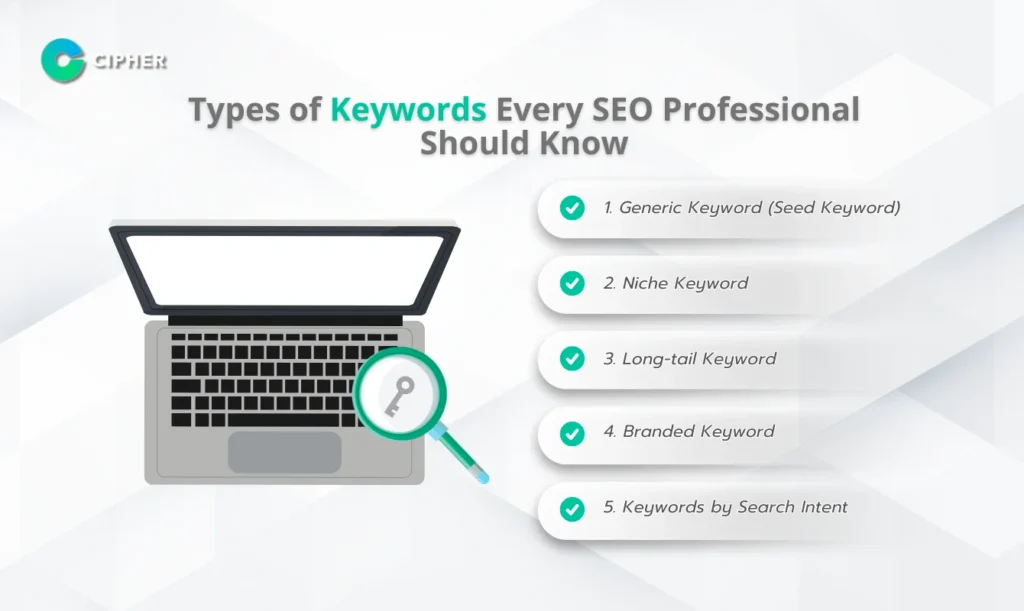Table of Contents
What is Keyword in SEO? Why are Website Keywords for SEO Important?

Keyword SEO refers to the strategic use of words or phrases people type into search engines (like Google) when looking for information. When someone enters a search query that matches the website keywords for SEO on your site, your pages have a chance to appear in the Search Engine Result Pages (SERPs).
For a simple example, if someone wants information about “Chiang Mai hotels with good atmosphere” and types this phrase into Google, “Chiang Mai hotels with good atmosphere” becomes a valuable keyword for SEO targeting.
Finding appropriate keywords for SEO is crucial because they act as:
- A bridge between customers and your website – helping filter people genuinely interested in your content or products
- Your online store’s location – similar to opening a shop in a prime location; if you choose high-volume SEO keywords and your site ranks well, it’s like having a storefront in a high-traffic area
- An indicator of success opportunity – keyword research for SEO helps you analyze whether your website has a chance to rank highly and how much investment the competition requires
Types of Keywords Every SEO Professional Should Know

1. Generic Keywords (Seed Keywords)
Generic keywords for SEO are broad, non-specific terms, usually consisting of 1-2 words with very high search volume but equally high competition.
Examples of Generic SEO Keywords:
- Shoes
- Phone
- Coffee
- Clothing
- Cars
Advantages: If you rank for these website keywords for SEO, you’ll get many website visitors. Disadvantages: Extremely competitive, difficult to rank for, and visitors may not be your target audience.
Generic keywords are better used as “starting points” for keyword research for SEO rather than as primary optimization targets.
2. Niche Keywords
Niche keywords in SEO are more specific, providing additional details beyond generic keywords. They have lower search volume but also less competition.
Examples of Niche Keywords for SEO:
- Men’s Adidas shoes
- Samsung mobile phones
- Doi Chaang coffee
- Korean fashion clothing
- Electric cars
Advantages: Less competitive than generic SEO keywords, reaching a more targeted audience. Disadvantages: Lower search volume.
Niche keywords are suitable for categories or subcategories on your website. Effective Keyword SEO optimization will help these terms rank better.
3. Long-tail Keyword
Long-tail keywords for SEO are highly specific phrases usually containing more than 3 words. They have low search volume but higher conversion rates, making them some of the most effective targets in keyword research for SEO.
Examples of Long-tail SEO Keywords:
- Men’s Adidas STAN SMITH 2025 model shoes
- Samsung Galaxy S25 Ultra black mobile phone
- Riverside cafes with good atmosphere in Chiang Mai
- Minimalist Korean fashion clothing for women
- Electric cars under 1 million baht with fast charging
Advantages: Low competition, easy to rank for, reaching audiences with high purchase intent. Disadvantages: Very low search volume.
Long-tail keywords are considered “money-making keywords in SEO” with high business value because people searching with these terms often have high purchase intent. Using the Yoast SEO plugin can help manage these website keywords for SEO effectively.
4. Branded Keyword
Branded keywords for SEO contain your brand or business name, suitable for brands that are already recognized.
Examples of Branded SEO Keywords:
- CIPHER Digital Marketing
- CIPHER Company
- CIPHER’s SEO services
- CIPHER online marketing services
Advantages: Very low competition (because it’s your own brand name) and potential to attract customers who already know your brand. Disadvantages: Limited to people who already know your brand.
5. Keywords by Search Intent
Beyond categorizing by length and specificity, keyword research for SEO also analyzes terms based on the searcher’s intention:
Transactional Keywords: Terms showing intent to purchase or conduct transactions
- Buy iPhone 17
- Book a hotel in Phuket
- Sign up for online English course
Informational Keywords: Terms showing a need for information or knowledge
- What is keyword in SEO?
- How to make carbonara pasta
- Flu symptoms
Commercial Keywords: Terms used to compare options before making a purchase decision
- Compare electric cars 2025
- Mirrorless camera reviews
- Dental braces clinics under $1,500
Navigational Keywords: Terms used to find specific websites or web pages
- Facebook login
- CIPHER contact
- Channel 3 live
Understanding search intent is a crucial part of effective Keyword SEO strategy development.
How to Find Website Keywords for SEO Suitable for Your Business
1. Understand the 3 Main Factors in Choosing Good Keywords for SEO
Relevance: SEO keywords must be relevant to your content and match user intent. Google has algorithms working behind the scenes to display results that best match user intent.
Authority: Content using those keywords in SEO must demonstrate expertise, provide value, and benefit readers—not content copied from elsewhere.
Search Volume: Check if website keywords for SEO have sufficient search volume using tools like Google Keyword Planner.
Understanding these fundamentals is essential according to proper Keyword SEO principles.
2. Identify the Types of Keywords Suitable for Your Website
As we’ve discussed the types of SEO keywords, consider which ones align with your business goals:
- If you want to build brand awareness, start with Generic Keywords
- If you want to increase sales quickly, focus on Long-tail Keywords for SEO with high purchase intent
- If your brand is already recognized, use Branded Keywords alongside others
3. Place Keywords on Web Pages That Match User Intent
Once you’ve found keywords in SEO, place them on appropriate web pages:
- If they’re product-related website keywords for SEO, place them on Product Pages
- If they’re knowledge-based keywords, place them on Blog Posts
Test by searching the keyword for SEO on Google to see what kind of results appear, ensuring they match user intent.
4. Use Keyword Analysis Tools to Filter for the Best Words
Many tools can help with keyword research for SEO:
Google Keyword Planner: A free tool from Google that helps find SEO keywords by providing search volume data and keyword trends
Ubersuggest: A tool that supports multiple languages, is easy to use, and provides good insights for efficient Keyword SEO analysis
Ahrefs: A professional-level tool with high accuracy, providing comprehensive information on keywords for SEO and competitors
SEMrush: An all-in-one tool that helps analyze website keywords for SEO and monitor competitors
Google Trends: Helps view trends and popularity of various search terms, providing target keywords in SEO that are currently popular
How Much Should Businesses Focus on Keyword SEO?
1. Business Product Categories
2. Target Customer Groups
3. Goals for Each Website Page
Creating Personas to Find Keywords That Target Your Audience Effectively
Creating Personas for Targeted Keyword Discovery Creating a persona means establishing a clear fictional identity of your target audience, which helps make keyword research more effective because you’ll understand how customers think and search.
Why Create Personas for Keyword SEO
When you deeply understand your target customers, you can select keywords that better match user intent. This makes your website more responsive to users’ needs and increases your chances of ranking higher.
Key Components of Personas for Keyword SEO
- Demographic Information: Age, gender, income, education, occupation
- Online Behavior: Platforms used, internet usage times, search devices
- Needs and Problems: Problems they’re trying to solve, what they’re searching for
- Language Used: Group-specific vocabulary, common expressions
- Purchase Decision Process: Which stage of the customer journey they’re in
Examples of Personas and Appropriate Keywords
Persona: Khun Nuch (28-year-old female digital marketer)
- Problem: Wants the company website to rank on Google but has limited budget
- Decision stage: Researching information (Awareness Stage)
- Language used: Digital marketing vocabulary, prefers concise content
- Appropriate keywords: “DIY SEO low budget”, “Basic SEO methods”, “Free SEO tools in Thai”
Persona: Khun Somchai (45-year-old SME company manager)
- Problem: Wants to increase online sales but lacks SEO knowledge
- Decision stage: Comparing services (Consideration Stage)
- Language used: Focuses on business results, likes clear numerical data
- Appropriate keywords: “SEO services price ROI worthwhile”, “Hire SEO to increase sales”, “Compare SEO companies Bangkok”
How to Apply Personas in Keyword Research
- Think from the persona’s perspective: “If I were Khun Nuch, how would I search?”
- Analyze channels the persona uses: Search forums, Facebook groups, or blog comments frequently used by the target audience
- Group keywords by Customer Journey: Categorize keywords according to the persona’s purchase decision stages
- Adjust language to match the persona: Use vocabulary and tone suitable for the target audience
When combining personas with the keyword analysis techniques mentioned earlier, you’ll get a more comprehensive and effective SEO strategy, helping you reach your target audience precisely and increasing opportunities to convert visitors into customers.
Keyword SEO Services from CIPHER
Professional Keyword Analysis Services for Your Business
Comprehensive Keyword Mapping
Competitor Analysis and Market Gap Identification
Creating Content That Matches Keywords and User Needs
Continuous Keyword Strategy Improvement
Summary
Frequently Asked Questions
What is Keyword in SEO?
How to Find Keywords for SEO?
- Use keyword research for SEO tools like Google Keyword Planner, Ubersuggest, or Ahrefs
- Analyze competitors to see what SEO keywords high-ranking websites use
- Think from the customer’s perspective, imagine how customers would search for your products/services
- Check search volume and competition for each website keyword for SEO
- Choose keywords in SEO with sufficient search volume and not too much competition
What Types of Keywords Are There in SEO?
Keywords in SEO can be divided into 5 main types:
- Generic Keywords – Broad terms like “shoes,” “phones” (high competition)
- Niche Keywords – More specific terms like “Nike running shoes,” “Samsung phones”
- Long-tail Keywords – Very specific long phrases like “women’s black Nike Pegasus running shoes,” “how to choose mobile phones for seniors”
- Branded Keywords – Terms containing brand names like “CIPHER Digital Marketing”
- Keywords by Intent – Divided into Transactional (buy), Informational (find info), Commercial (compare), and Navigational (find specific sites)





